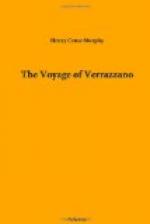the time of sowing they are governed by the moon,
the sprouting of grain, and many other ancient usages.
They live by hunting and fishing, and they are long-lived.
If they fall sick, they cure themselves without medicine,
by the heat of the fire, and their death at last comes
from extreme old age. We judge them to be very
affectionate and charitable towards their relatives—making
loud lamentations in their adversity, and in their
misery calling to mind all their good fortune.
At their departure out of life, their relations mutually
join in weeping, mingled with singing, for a long
while. This is all that we could learn of them.
This region is situated in the parallel of Rome, being
41 degrees 40’ of north latitude, but much colder
than accidental circumstances, and not by nature,
as I shall hereafter explain to your Majesty, and
confine myself at present to the description of its
local situation. It looks towards the south, on
which side the harbour is half a league broad; afterwards
upon entering it, the extent between the east (oriente)
and north is twelve leagues,[Footnote: See ante,
p.51, note] and than enlarging itself it forms a very
large bay, twenty leagues in circumference, in which
are five small islands, of great fertility and beauty,
covered with large and lofty trees. Among these
islands any fleet, however large, might ride safely,
without fear of tempests or other dangers. Turning
towards the south, at the entrance of the harbour,
on both sides, there are very pleasant hills, and many
streams of clear water, which flow down to the sea.
In the midst of the entrance there is a rock of freestone,
formed by nature, and suitable for the construction
of any kind of machine or bulwark for the defence
of the harbour.
Having supplied ourselves with every thing necessary,
on the sixth (sei) of May we departed from the port,
and sailed one hundred and fifty leagues, keeping
so close to the coast as never to lose it from our
sight; the nature of the country appeared much the
same as before, but the mountains were a little higher,
and all in appearance rich in minerals. We did
not stop to land as the weather was very favourable
for pursuing our voyage, and the country presented
no variety. The shore stretched to the east, and
fifty leagues beyond more to the north, where we found
a more elevated country, full of very thick woods
of fir trees, cypresses and the like, indicative of
a cold climate. The people ware entirely different
from the others we had seen, whom we had found kind
and gentle, but these were so rude and barbarous that
we were unable by any signs we could make, to hold
communication with them. They clothe themselves
in the skins of bears, lynxes, seals and other animals.
Their food, as far as we could judge by several visits
to their dwellings, is obtained by hunting and fishing,
and fruits, which are a sort of root of spontaneous
growth. They have no pulse, and we saw no signs
of cultivation; the land appears sterile and unfit




